Huawei and Espionage: Allegations, Risks, and Geopolitical Impact
VerifiedAdded on 2022/07/26
|5
|981
|21
Essay
AI Summary
This essay examines the allegations of espionage against Huawei, a multinational corporation specializing in telecommunications and technology, focusing on the potential national security threats posed to the United States. The essay highlights instances of alleged industrial espionage, including copying Cisco's router designs and recruiting Motorola employees to steal proprietary secrets. It discusses concerns about the Chinese government's influence on Huawei and its potential use for spying on government officials, stealing military secrets, and committing economic espionage. The essay also touches upon the factors contributing to the United States' lag in 4G network development and the lack of transparency surrounding Huawei's operations. The Huawei case illustrates the benefits and disadvantages of government-supported businesses, particularly concerning espionage suspicions and potential sanctions. Desklib provides access to similar essays and study tools for students.
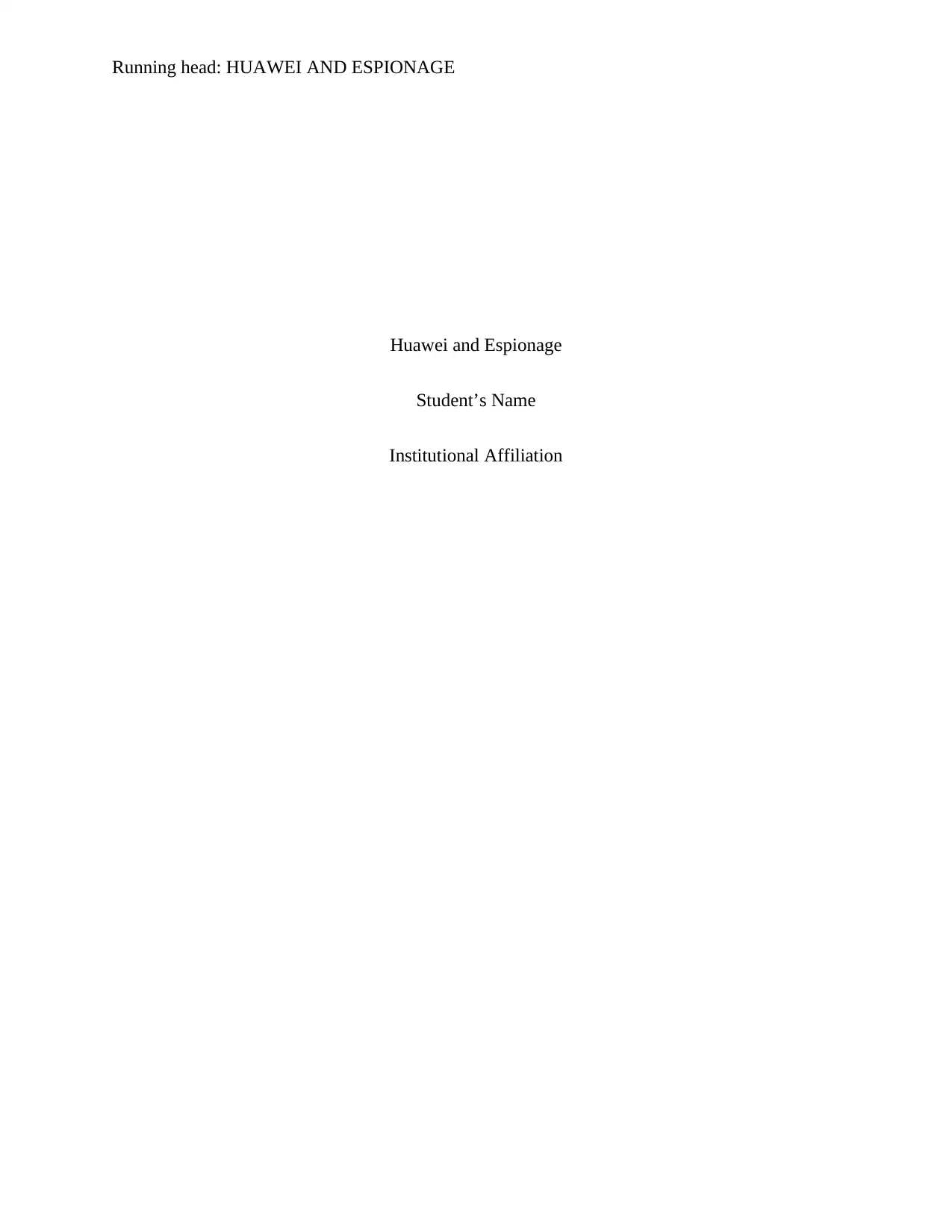
Running head: HUAWEI AND ESPIONAGE
Huawei and Espionage
Student’s Name
Institutional Affiliation
Huawei and Espionage
Student’s Name
Institutional Affiliation
Paraphrase This Document
Need a fresh take? Get an instant paraphrase of this document with our AI Paraphraser
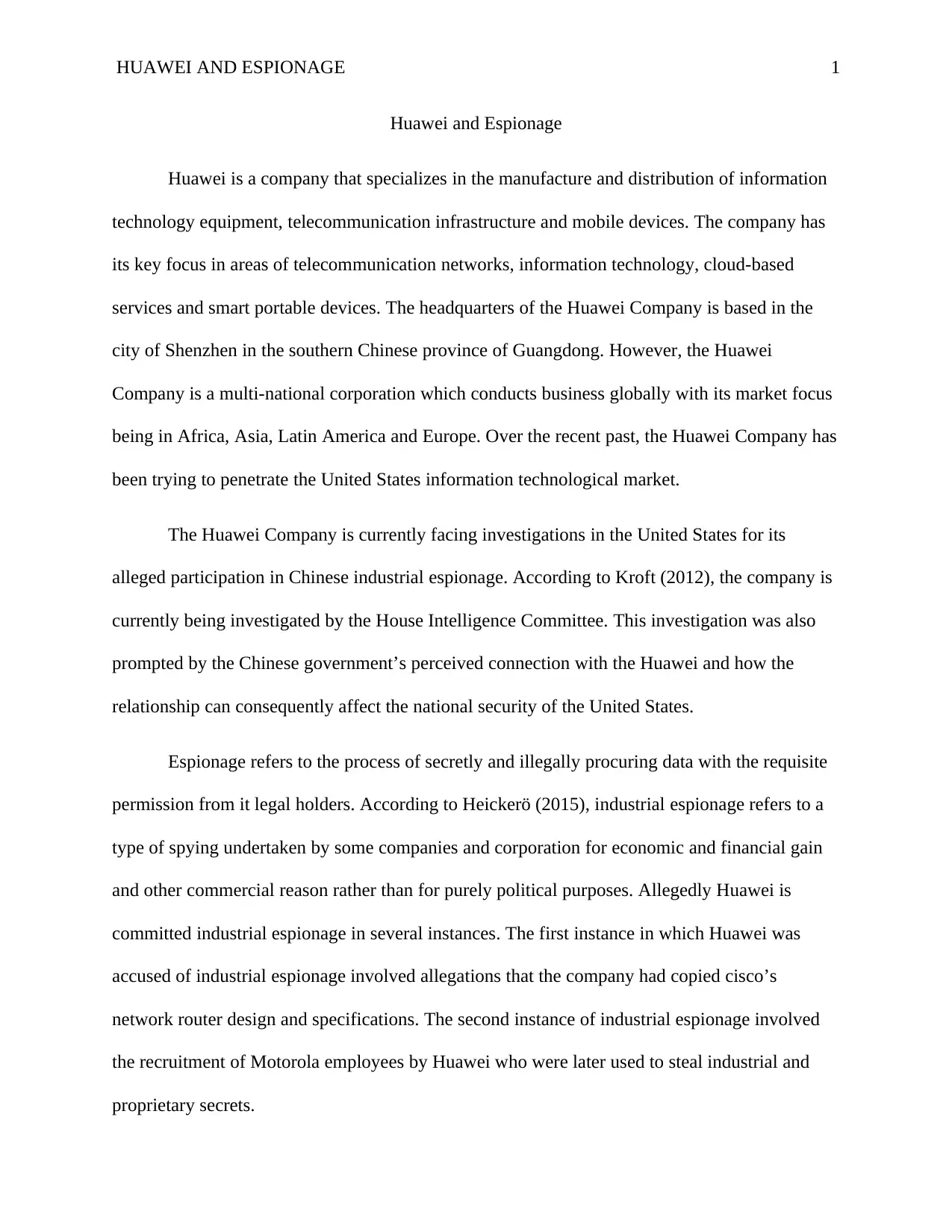
HUAWEI AND ESPIONAGE 1
Huawei and Espionage
Huawei is a company that specializes in the manufacture and distribution of information
technology equipment, telecommunication infrastructure and mobile devices. The company has
its key focus in areas of telecommunication networks, information technology, cloud-based
services and smart portable devices. The headquarters of the Huawei Company is based in the
city of Shenzhen in the southern Chinese province of Guangdong. However, the Huawei
Company is a multi-national corporation which conducts business globally with its market focus
being in Africa, Asia, Latin America and Europe. Over the recent past, the Huawei Company has
been trying to penetrate the United States information technological market.
The Huawei Company is currently facing investigations in the United States for its
alleged participation in Chinese industrial espionage. According to Kroft (2012), the company is
currently being investigated by the House Intelligence Committee. This investigation was also
prompted by the Chinese government’s perceived connection with the Huawei and how the
relationship can consequently affect the national security of the United States.
Espionage refers to the process of secretly and illegally procuring data with the requisite
permission from it legal holders. According to Heickerö (2015), industrial espionage refers to a
type of spying undertaken by some companies and corporation for economic and financial gain
and other commercial reason rather than for purely political purposes. Allegedly Huawei is
committed industrial espionage in several instances. The first instance in which Huawei was
accused of industrial espionage involved allegations that the company had copied cisco’s
network router design and specifications. The second instance of industrial espionage involved
the recruitment of Motorola employees by Huawei who were later used to steal industrial and
proprietary secrets.
Huawei and Espionage
Huawei is a company that specializes in the manufacture and distribution of information
technology equipment, telecommunication infrastructure and mobile devices. The company has
its key focus in areas of telecommunication networks, information technology, cloud-based
services and smart portable devices. The headquarters of the Huawei Company is based in the
city of Shenzhen in the southern Chinese province of Guangdong. However, the Huawei
Company is a multi-national corporation which conducts business globally with its market focus
being in Africa, Asia, Latin America and Europe. Over the recent past, the Huawei Company has
been trying to penetrate the United States information technological market.
The Huawei Company is currently facing investigations in the United States for its
alleged participation in Chinese industrial espionage. According to Kroft (2012), the company is
currently being investigated by the House Intelligence Committee. This investigation was also
prompted by the Chinese government’s perceived connection with the Huawei and how the
relationship can consequently affect the national security of the United States.
Espionage refers to the process of secretly and illegally procuring data with the requisite
permission from it legal holders. According to Heickerö (2015), industrial espionage refers to a
type of spying undertaken by some companies and corporation for economic and financial gain
and other commercial reason rather than for purely political purposes. Allegedly Huawei is
committed industrial espionage in several instances. The first instance in which Huawei was
accused of industrial espionage involved allegations that the company had copied cisco’s
network router design and specifications. The second instance of industrial espionage involved
the recruitment of Motorola employees by Huawei who were later used to steal industrial and
proprietary secrets.
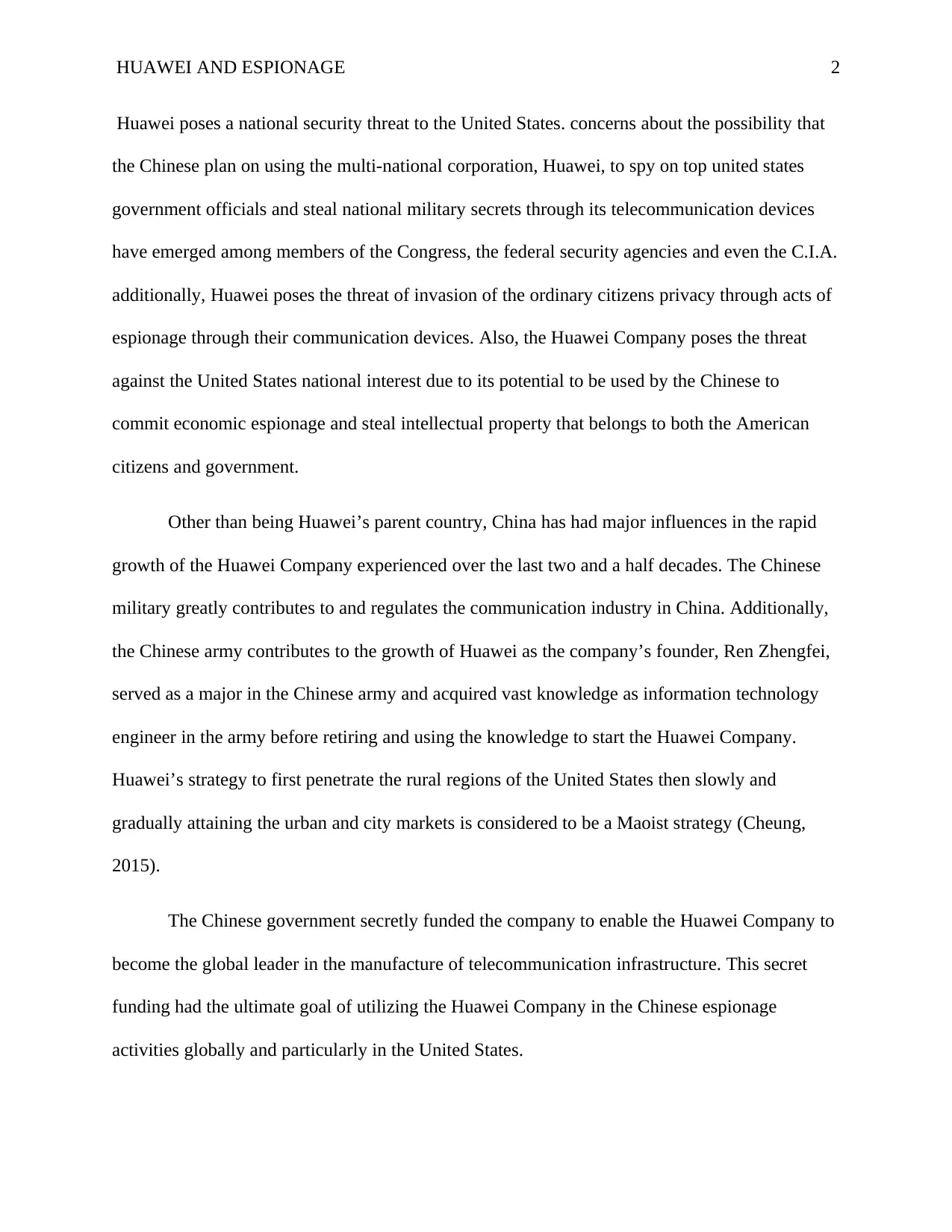
HUAWEI AND ESPIONAGE 2
Huawei poses a national security threat to the United States. concerns about the possibility that
the Chinese plan on using the multi-national corporation, Huawei, to spy on top united states
government officials and steal national military secrets through its telecommunication devices
have emerged among members of the Congress, the federal security agencies and even the C.I.A.
additionally, Huawei poses the threat of invasion of the ordinary citizens privacy through acts of
espionage through their communication devices. Also, the Huawei Company poses the threat
against the United States national interest due to its potential to be used by the Chinese to
commit economic espionage and steal intellectual property that belongs to both the American
citizens and government.
Other than being Huawei’s parent country, China has had major influences in the rapid
growth of the Huawei Company experienced over the last two and a half decades. The Chinese
military greatly contributes to and regulates the communication industry in China. Additionally,
the Chinese army contributes to the growth of Huawei as the company’s founder, Ren Zhengfei,
served as a major in the Chinese army and acquired vast knowledge as information technology
engineer in the army before retiring and using the knowledge to start the Huawei Company.
Huawei’s strategy to first penetrate the rural regions of the United States then slowly and
gradually attaining the urban and city markets is considered to be a Maoist strategy (Cheung,
2015).
The Chinese government secretly funded the company to enable the Huawei Company to
become the global leader in the manufacture of telecommunication infrastructure. This secret
funding had the ultimate goal of utilizing the Huawei Company in the Chinese espionage
activities globally and particularly in the United States.
Huawei poses a national security threat to the United States. concerns about the possibility that
the Chinese plan on using the multi-national corporation, Huawei, to spy on top united states
government officials and steal national military secrets through its telecommunication devices
have emerged among members of the Congress, the federal security agencies and even the C.I.A.
additionally, Huawei poses the threat of invasion of the ordinary citizens privacy through acts of
espionage through their communication devices. Also, the Huawei Company poses the threat
against the United States national interest due to its potential to be used by the Chinese to
commit economic espionage and steal intellectual property that belongs to both the American
citizens and government.
Other than being Huawei’s parent country, China has had major influences in the rapid
growth of the Huawei Company experienced over the last two and a half decades. The Chinese
military greatly contributes to and regulates the communication industry in China. Additionally,
the Chinese army contributes to the growth of Huawei as the company’s founder, Ren Zhengfei,
served as a major in the Chinese army and acquired vast knowledge as information technology
engineer in the army before retiring and using the knowledge to start the Huawei Company.
Huawei’s strategy to first penetrate the rural regions of the United States then slowly and
gradually attaining the urban and city markets is considered to be a Maoist strategy (Cheung,
2015).
The Chinese government secretly funded the company to enable the Huawei Company to
become the global leader in the manufacture of telecommunication infrastructure. This secret
funding had the ultimate goal of utilizing the Huawei Company in the Chinese espionage
activities globally and particularly in the United States.
⊘ This is a preview!⊘
Do you want full access?
Subscribe today to unlock all pages.

Trusted by 1+ million students worldwide
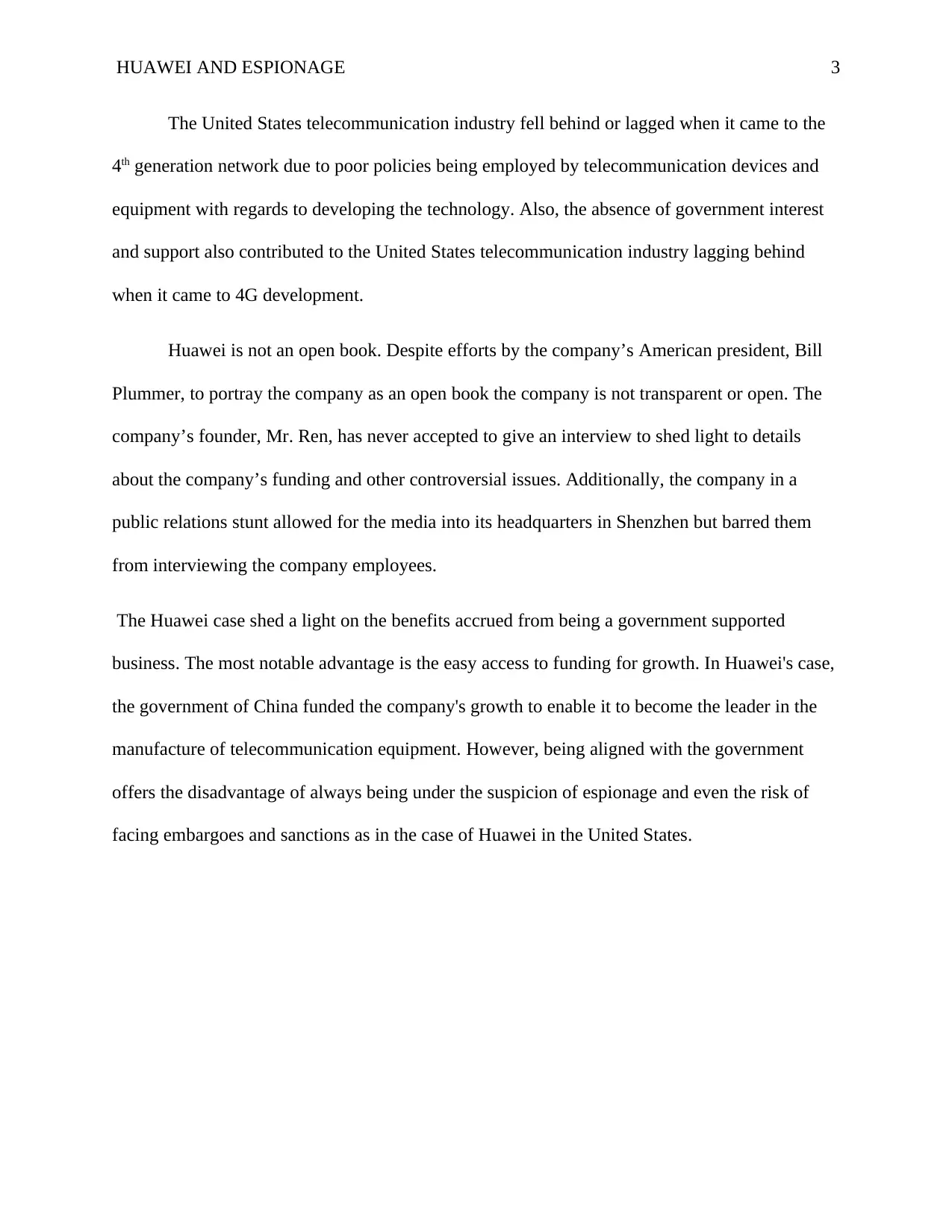
HUAWEI AND ESPIONAGE 3
The United States telecommunication industry fell behind or lagged when it came to the
4th generation network due to poor policies being employed by telecommunication devices and
equipment with regards to developing the technology. Also, the absence of government interest
and support also contributed to the United States telecommunication industry lagging behind
when it came to 4G development.
Huawei is not an open book. Despite efforts by the company’s American president, Bill
Plummer, to portray the company as an open book the company is not transparent or open. The
company’s founder, Mr. Ren, has never accepted to give an interview to shed light to details
about the company’s funding and other controversial issues. Additionally, the company in a
public relations stunt allowed for the media into its headquarters in Shenzhen but barred them
from interviewing the company employees.
The Huawei case shed a light on the benefits accrued from being a government supported
business. The most notable advantage is the easy access to funding for growth. In Huawei's case,
the government of China funded the company's growth to enable it to become the leader in the
manufacture of telecommunication equipment. However, being aligned with the government
offers the disadvantage of always being under the suspicion of espionage and even the risk of
facing embargoes and sanctions as in the case of Huawei in the United States.
The United States telecommunication industry fell behind or lagged when it came to the
4th generation network due to poor policies being employed by telecommunication devices and
equipment with regards to developing the technology. Also, the absence of government interest
and support also contributed to the United States telecommunication industry lagging behind
when it came to 4G development.
Huawei is not an open book. Despite efforts by the company’s American president, Bill
Plummer, to portray the company as an open book the company is not transparent or open. The
company’s founder, Mr. Ren, has never accepted to give an interview to shed light to details
about the company’s funding and other controversial issues. Additionally, the company in a
public relations stunt allowed for the media into its headquarters in Shenzhen but barred them
from interviewing the company employees.
The Huawei case shed a light on the benefits accrued from being a government supported
business. The most notable advantage is the easy access to funding for growth. In Huawei's case,
the government of China funded the company's growth to enable it to become the leader in the
manufacture of telecommunication equipment. However, being aligned with the government
offers the disadvantage of always being under the suspicion of espionage and even the risk of
facing embargoes and sanctions as in the case of Huawei in the United States.
Paraphrase This Document
Need a fresh take? Get an instant paraphrase of this document with our AI Paraphraser
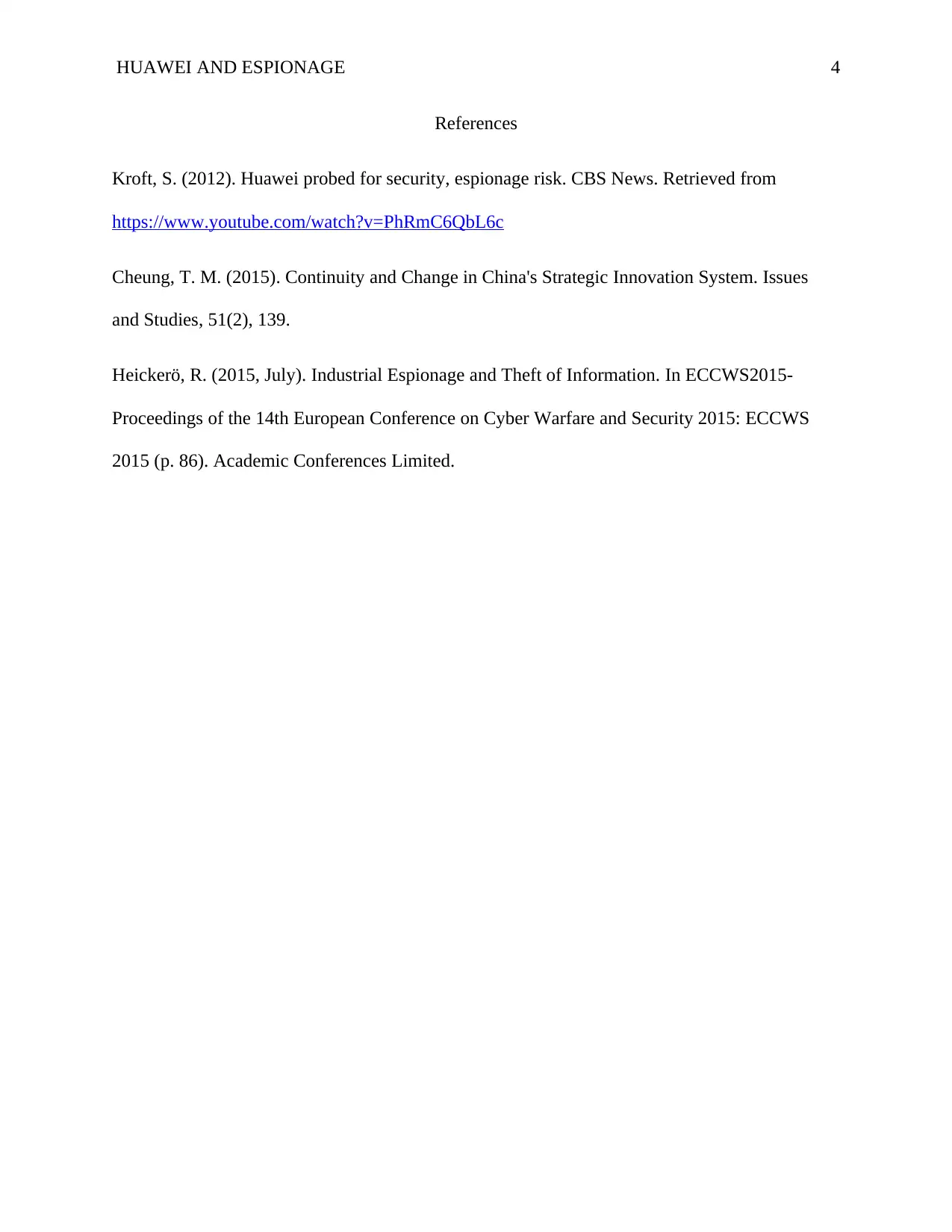
HUAWEI AND ESPIONAGE 4
References
Kroft, S. (2012). Huawei probed for security, espionage risk. CBS News. Retrieved from
https://www.youtube.com/watch?v=PhRmC6QbL6c
Cheung, T. M. (2015). Continuity and Change in China's Strategic Innovation System. Issues
and Studies, 51(2), 139.
Heickerö, R. (2015, July). Industrial Espionage and Theft of Information. In ECCWS2015-
Proceedings of the 14th European Conference on Cyber Warfare and Security 2015: ECCWS
2015 (p. 86). Academic Conferences Limited.
References
Kroft, S. (2012). Huawei probed for security, espionage risk. CBS News. Retrieved from
https://www.youtube.com/watch?v=PhRmC6QbL6c
Cheung, T. M. (2015). Continuity and Change in China's Strategic Innovation System. Issues
and Studies, 51(2), 139.
Heickerö, R. (2015, July). Industrial Espionage and Theft of Information. In ECCWS2015-
Proceedings of the 14th European Conference on Cyber Warfare and Security 2015: ECCWS
2015 (p. 86). Academic Conferences Limited.
1 out of 5
Your All-in-One AI-Powered Toolkit for Academic Success.
+13062052269
info@desklib.com
Available 24*7 on WhatsApp / Email
![[object Object]](/_next/static/media/star-bottom.7253800d.svg)
Unlock your academic potential
Copyright © 2020–2026 A2Z Services. All Rights Reserved. Developed and managed by ZUCOL.


